Lost in a foreign land, geographically and digitally?
The growing risks of online scams can often detract from the excitement of travel. As time progresses, cybercriminals’ tactics change, making it harder to protect your private information while traveling.
Just last month, I witnessed a harrowing experience. I started making plans for a much-needed Bali vacation. While browsing for exciting offers, I stumbled upon a seemingly legitimate travel website. Well, I’m not gonna lie! I was super excited as I was getting amazing deals and about to book my flights and hotels.
However, as I was about to pay, something bothered me. A nagging voice in my head wondered about the website’s authenticity. Thankfully, I listened to my inner voice and was determined to look into it further. It turned out that the website turned into a cleverly disguised phishing scam designed to steal my credit card information.
This near-miss was a prominent reminder of the ubiquitous risk of online scams — especially when traveling. However, a trip is not free of concerns, so you must prepare yourself with premium and reliable tools that help you remain safe from this virtual menace.
This blog illuminates how to maintain data safety while traveling.
Excited? We too!
Let’s get started now!
How to Avoid Travel Scams Effectively?
Here are some essential tips to help you avoid travel scams:
1. Trust Reputable Websites Only
- Tour preparations: Book your tour via trustworthy and noted web pages and travel agents only.
- Cross-check: Confirm if the website is secured (using HTTPS) to guarantee its validity before making purchases.
- Avoid Unfamiliar Websites: Be cautious of weird emails or pop-up ads claiming amazing deals.
2. Be Cautious of Phishing Attacks
- Spot the Red Flags: Phishing emails often have poor grammar, an imperative request, and/or questionable links.
- Think Before You Click: Do not download files from untrusted sources and click on untrusted links.
- Verify the Sender’s Address: You must check the sender’s email address to ensure its validity.
Related Read: Top 5 Antivirus Black Friday & Cyber Monday Deals in 2024: Save Big With Best Deals
3. Protect Your Online Data
- Stick to Strong Passwords: Ensure you have a minimum of a strong and unique password for every online account.
- Enable Two-Factor Authentication (2FA): Two-factor authentication adds an extra layer of security by requesting a second verification step of your identity.
4. Research and Verify Your Accommodations
- Beware of Fake Listings: Cybercriminals can post fake listings on popular booking systems.
- Check Reviews: Don’t forget to check both positive and negative lodging reviews.
- Be Cautious of Zero-Review Properties: Avoid making a reservation for in like (or somewhat) lodging counted on three party accounts.
- Look for Verified Hosts: When lodging, claim a stay with verified hosts and/or accommodations with verified host profiles and/or assurance policies.
Stay Alert! Don’t Fall for Fake Confirmations.
Use AVP Suite for phishing protection and malware defense to safeguard your data.
Get AVP Suite for Free!

5. Check Website Security Before Entering Personal Information
- Look for the Padlock: Confirm whether the website has HTTP S. A padlock icon at the top of the browser window confirms that it is secured.
- Validate the URL: Double-check and confirm the official website.
- Protect Your Data on Public Wi-Fi: Utilize to encrypt your net connection and protect your data. You can use a strong VPN from AVP Suite as part of the integrated antivirus software, which ensures secure browsing and data security.
Also Read: Top Tips to Spot Phishing Lures & How to Resolve It!
6. Be Wary of Wi-Fi Hotspots
- Public Wi-Fi Risks: Don’t perform essential tasks like online shopping or banking on public Wi-Fi connections.
- Connect a VPN: A VPN, which encrypts your Internet traffic, is essential, along with a powerful antivirus such as AVP Suite, which protects your devices from viruses and their black magic.
7. Verify Payment Requests Carefully
- Verify Unexpected Requests: Directly contact a trusted booking entity if you receive unusual payment requests.
- Avoid Unsecure Channels: Never share price information via email, text, or in an unsecured medium.
- Stay Vigilant: Proceed cautiously to any urgent payment request and from parties you are unfamiliar with.
Read More: Is Your Computer Acting Strange? Here’s Why It Could Be Malware!
Travel Smarter, Travel Safer with AVP Suite!
Traveling is meant to be relaxing and enjoyable, and being more vigilant helps you avoid scams derailing your trip. By following these measures, which include avoiding phishing or scam emails, verifying booking websites, and holding connected sessions, you can have decent safeguards against common travel scams.
So, now, when you book and browse, you can do so securely using AVP Suite Antivirus and VPN, and as an added benefit, you have an additional layer of protection. It protects your devices from malware, phishing, and ransomware attacks and allows you to travel worry-free. So, before you plot out your next adventure, secure your devices and the data on them.
Ready to take control of your online safety? Get smooth, scam-free travel with AVP Suite!
Download AVP Suite Now!


